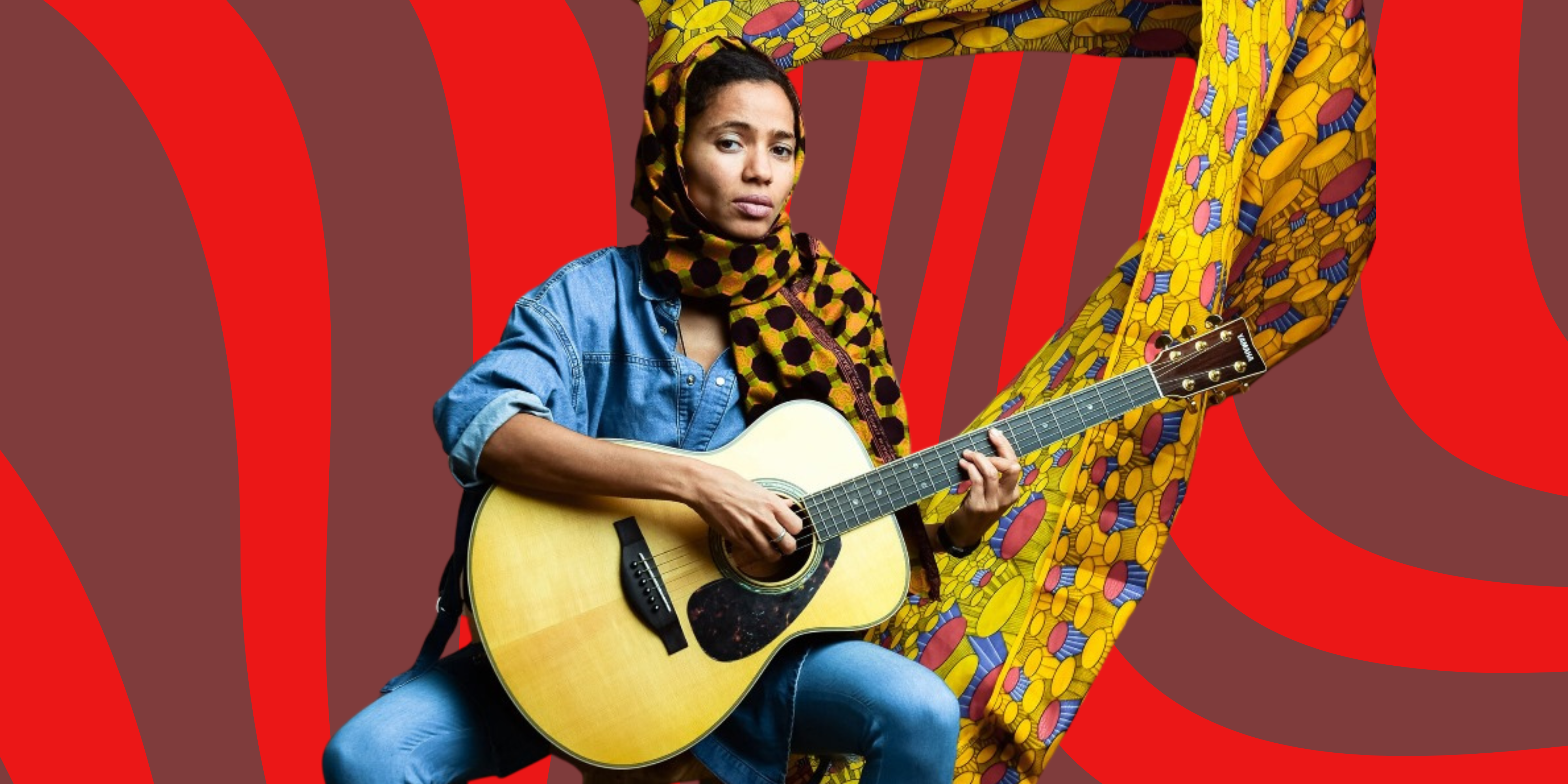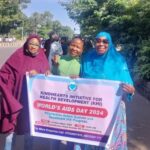In a 1973 letter published in The New York Times, a Black director lamented the harsh criticism his film received from white reviewers. “It is a terrible thing to be a Black artist in this country,” he wrote, underscoring the many obstacles Black creatives face.
Years later, Nigerian singer and songwriter Nneka Lucia Egbuna would encounter similar challenges during her music tours across Europe and the United States.
In one particularly disheartening incident, she and her band were invited to perform in a zoo, placed among the animals. In another European country, a promotional poster for her concert featured a photoshopped giraffe wrapped around her neck—an offensive caricature of her African identity.
Many artists might have caved under such racial pressures. Not Nneka.
Born in 1980 and raised in Warri, Nigeria, Nneka grew up under the care of her father and stepmother, who owned a roadside restaurant. Her relationship with her stepfamily was fraught with tension. She was often blamed for mishaps or accused of wrongdoings. Hunger was a familiar companion, making her childhood one of the most painful phases of her life.
At her stepmother’s restaurant, she worked tirelessly, cooking and scrubbing greasy plates. These experiences forged her into a strong-willed and independent individual.
At school, she consistently ranked second or third in her class but found greater fulfilment in extracurricular activities like fine arts and athletics. She excelled in relay races and had a natural artistic touch. But she longed to explore a world beyond Warri.
Her first glimpse of that world came in 1997 when she visited Lagos. Captivated by its towering buildings and bustling streets, her desire to see more of the world intensified.
Three years later, she moved to Germany, enrolling at the University of Hamburg, where she studied archaeology and anthropology between 2003 and 2008. A year later, she pursued art at a private school, diving into yoga, massage therapy and Zen meditation.
Despite her childhood choir experiences, Nneka never envisioned a music career, like her peers. Later, in 2007, her schoolmate, Omawumi, would rise to musical spotlight after emerging as first runner-up at a reality TV show. But in Germany, she found herself drawn to its expressive power, meeting people with an affinity for sound.
Her first major performance came in 2004 at Funky Pussy, a club in Hamburg’s red-light district. That night, she secured a record deal, marking a turning point in her life.
Her debut hit, “Heartbeat,” released in 2008, resonated globally. Its minimalist video, shot in Nigeria, garnered international acclaim. Soon, she was performing alongside Nas and Damian Marley in 2010 and appearing on platforms like The Late Show with David Letterman in 2011.
Nneka’s music is deeply rooted in social consciousness. One of her most memorable performances came in 2011 in the Niger Delta, where she sang “VIP (Vagabond in Power),” a bold critique of corruption and environmental degradation inspired by Fela Kuti. Among her audience were government officials, and her fearless delivery nearly led to her arrest. She escaped just in time.
Despite her international success, Nneka often felt like an outsider in foreign spaces. She and her band were sometimes treated as exotic spectacles rather than respected musicians. These experiences, though frustrating, only strengthened her resolve to challenge stereotypes and redefine perceptions of African artistry.
At one point, she took a break from music for self-reflection. Yet, even during this period, she continued to release new records and tour across Europe and Africa. In January 2025, she released “Mirror,” a single exploring the divinity within oneself. “We take a lot of time looking for God. And we are God,” she mused.
Beyond music, Nneka is an artist, writer and entrepreneur. She released an art book featuring her paintings and poetry in 2016. In 2018, she ventured into cosmetics, creating shea butter-based products for mixed-race girls.
Her passion for social impact led to the creation of ROPE (Reach Out, Promote, Empower) Foundation in 2010, which has worked with war-affected girls in Sierra Leone, provided solar energy to Eritrean communities and supported women and children in Nigeria and Germany.
In 2019, she founded Nelu Herbal Life, advocating for a return to African herbal medicine and indigenous healing practices.
Looking ahead, Nneka envisions a life of continuous growth. She aspires to master the guitar and piano while continuing to create music that speaks to the soul. She finds fulfilment in travel, experience and inspiring others through her art and activism.
To young Black artists striving for success, she offers this advice: “Be yourself. Do it for the love, and with love. You are enough. You are divine. Practice, practice, and release the effort.”
Through it all, Nneka’s journey testifies to how pain can be transformed into purpose, struggle into strength and art into activism. Her story is not just one of survival but of transformation—an unbreakable spirit refusing to be silenced.
Yet, the hardest struggles were always closer to home. Her childhood was marked by abandonment and estrangement. She was disowned and sent back to Africa in 1997 when she thought she was leaving for a better life.
“Sometimes we come into this life to learn,” she says. “And I guess we choose the paths we need to work on.” Still, she insists she carries no bitterness. “Unforgiveness makes us ugly,” she adds. “Ugly… put that in there.” She laughs, but the truth in her words lingers.
After years of estrangement, she finally met her biological mother, hoping for healing. But the reunion reopened old wounds. “She was distant, unwelcoming, as if she had already closed that chapter,” Nneka recalls.
The rejection hurt, but rather than let it consume her, she chose to let go. “Forgiveness is for me, not for them,” she says. Over time, she made peace with both parents, recognising that their actions were shaped by their own struggles. “I have forgiven now. I have forgiven.”
The world has recognised her. She has won awards—the MOBO Award in 2009, the MTV Africa Award for Best Video in 2010, and several others. Even so these accolades do not define her.
Nneka envisions a shift in the music industry, where authenticity is valued over commercial appeal. “We need more realness, more depth,” she says.
“Music should reflect truth, not just be a product to sell. Artists should express themselves fearlessly.” She is also a strong advocate for musicians owning their masters. “It’s their legacy, their soul’s imprint. We create from within; we should own what is ours.”
Nneka Lucia Egbuna, a Nigerian singer and songwriter, has faced significant adversity throughout her life and career, often encountering racial discrimination, as many Black artists do. Despite these challenges, she has persevered. Raised in Nigeria in a tense family environment, Nneka's tough upbringing shaped her into a resilient, independent individual. Her journey to international fame began in Germany, where she studied archaeology and anthropology before delving into music. Her first major performance in 2004 led to a record deal and ultimately global recognition with her 2008 hit "Heartbeat."
Nneka's music is known for its social consciousness, often tackling corruption and environmental issues, such as her song "VIP (Vagabond in Power)." Despite her success, she frequently felt like an outsider, often perceived through exotic stereotypes rather than as an authentic artist. Nevertheless, these experiences fueled her resolve to challenge stereotypes and redefine African artistry.
Beyond music, Nneka is an artist, writer, and entrepreneur, engaging in social impact through initiatives like ROPE Foundation and Nelu Herbal Life, which promote empowerment and indigenous healing practices. Her personal journey includes struggles with familial rejection and healing through forgiveness, underscoring the importance of inner peace over external validation.
Nneka continues to advocate for authenticity in the music industry, calling for a greater emphasis on depth and truth over commercial appeal. She stresses the significance of musicians owning their work, viewing it as a legacy and a reflection of their soul. Her narrative is one of transformation from adversity to empowering many through art and activism.






